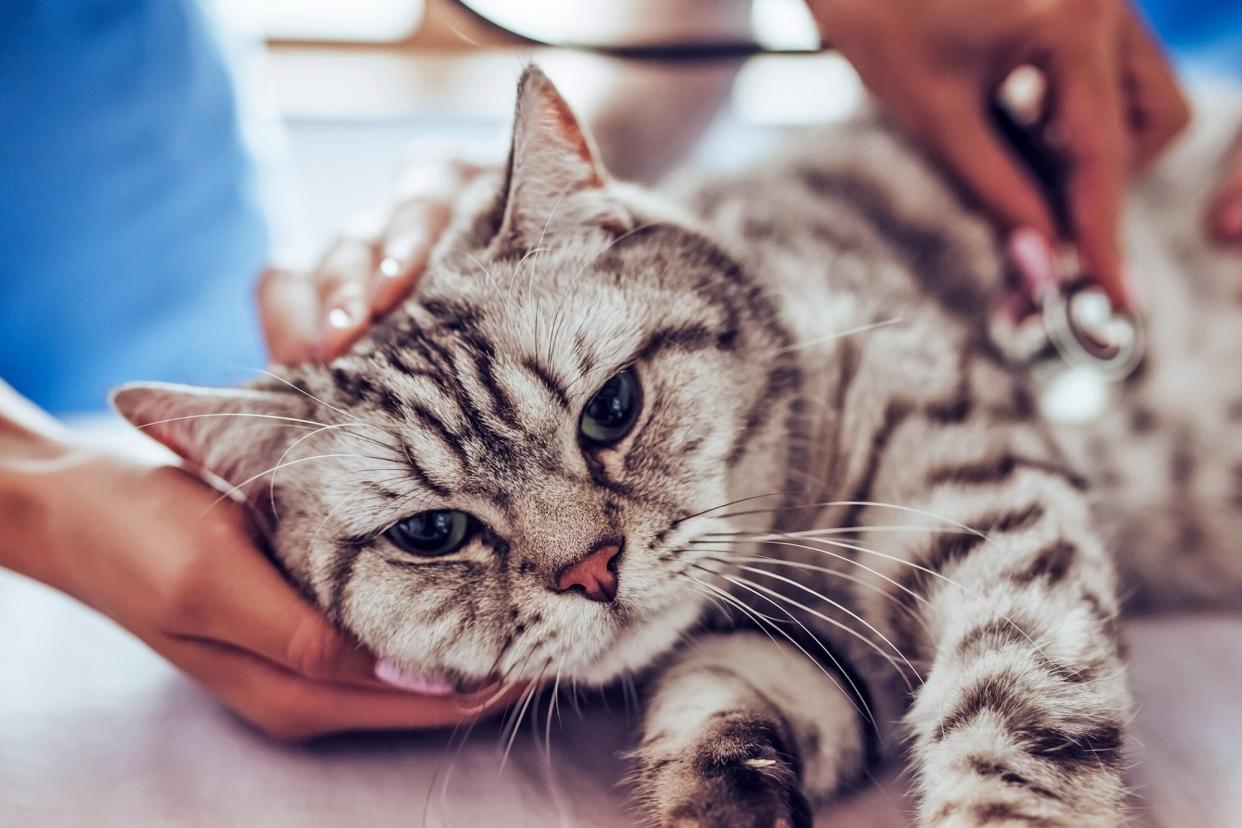If Your Vet Hears Your Cat Has a Heart Murmur, Here's What It Might Mean

Vasyl Dolmatov / Getty
TABLE OF CONTENTS
On This Page
What Is a Heart Murmur?
Causes
Signs and Symptoms
Outlook
Our favorite felines aren't always the most forthcoming with their health issues. Unfortunately, according to Brian Evans, DVM, the medical director at Dutch, a silent killer of them is heart disease. One possible indication of it is a heart murmur in cats. However, not always—and sometimes, a murmur isn't a problem at all. Let us explain.
What Is a Heart Murmur?
"Heart murmurs are the sound of turbulent blood flow, which isn't a typical finding," Evans tells Daily Paws. "Blood should flow smoothly and in one direction through all of the chambers of the heart. When that doesn't happen, such as with a leaky heart valve, blood gets pumped in the wrong direction and swishes with the incoming blood, creating the turbulence and the sound."
Veterinarians grade the intensity of that sound on a scale from 1–6, with 6 considered the most severe. Cummings School of Veterinary Medicine at Tufts University provides this breakdown for the grades of heart murmurs heard through a stethoscope:
Grade 1: After about two minutes, vets hear a 'swishing' sound while listening to the heart of a calm cat in a quiet room.
Grade 2: The faint sound of a heart murmur is apparent right away.
Grade 3: This heart murmur is considered medium-intensity.
Grade 4: Vets detect a loud murmur.
Grade 5: This strong murmur often produces what's referred to as a 'thrill'—a vibration vets feel on a cat's chest.
Grade 6: Considered quite uncommon, this heart murmur in cats can be heard without a stethoscope.
Your vet may describe a murmur based on how they hear them in the heart cycle: continuously, systolically (when the heart muscle contracts and pumps blood into the arteries), or diastolically (when the heart muscle relaxes and the chambers fill with blood).
"As a pet parent, you won't be able to detect the heart murmur without a stethoscope and a trained ear," Evans says.
What Causes Heart Murmur in Cats?
Here's when a thorough veterinary exam is the key that unlocks this mystery. Heart murmurs, Evans says, aren't the problem: they're only a potential signal that something may be wrong with the heart.
Structural abnormalities, also referred to as cardiomyopathies or diseases of the heart muscle, are frequent problems. The most common one is Feline Hypertrophic Cardiomyopathy (HCM), and often causes congestive heart failure. Some breeds have genetic predisposition to HCM, including:
Some Rex cats
"When I hear a heart murmur, most of the time I cannot tell you where the problem is in the heart, just that there may be a problem that needs to be investigated further," Evans says. "We often recommend additional tests such as a chest X-ray or ideally, an echocardiogram with a board-certified cardiologist." He adds that many cats with heart disease might not even have a heart murmur. More on that in a moment.
Additionally, heart murmurs in cats are sometimes symptoms of non-cardiac medical issues, including:
Stress and anxiety might cause murmurs as well. "Cats can have what is called a 'dynamic right ventricular outflow tract obstruction', or DRVOTO, that causes a benign heart murmur and is typically heard only when they're stressed," Evans says. "There's nothing wrong with their heart—it's just beating forcefully and quickly and this causes the murmur, which typically disappears when they calm back down."
Signs and Symptoms of Heart Murmur in Cats
As Evans mentioned, your cat's heart murmur symptoms are often indicators of other health conditions. During a routine vet exam, listening to your furball's heartbeat is part of the checkup, and if something is detected, it opens up a dialogue.
However, he says there are signs of HCM or heart failure you might notice in your cat, including:
Weakness
Collapse
Inability to use their back legs
RELATED: Could Your Cat Have Feline Vestibular Disease?
There's also a screening blood test some vets might recommend to check for significant heart disease when cats don't have heart murmurs as a red flag. "It's called a proBNP test. Prior to performing anesthesia on any cat, I recommend submitting a blood panel that also includes the proBNP to better screen for asymptomatic cats that have significant heart disease," Evans says.
What's the Outlook? The Future for Cats With a Heart Murmur
Depending on the underlying cause, if there is significant heart disease, Evans says most cases can be treated with medication, and a cat's life expectancy can be up to two years after they've gone into heart failure.
"However, if the heart murmur is due to a benign cause such as DRVOTO, it shouldn't impact their quality or quantity of life in any way," he adds. So make sure to take your kitten or cat to the vet regularly to know what to expect.

